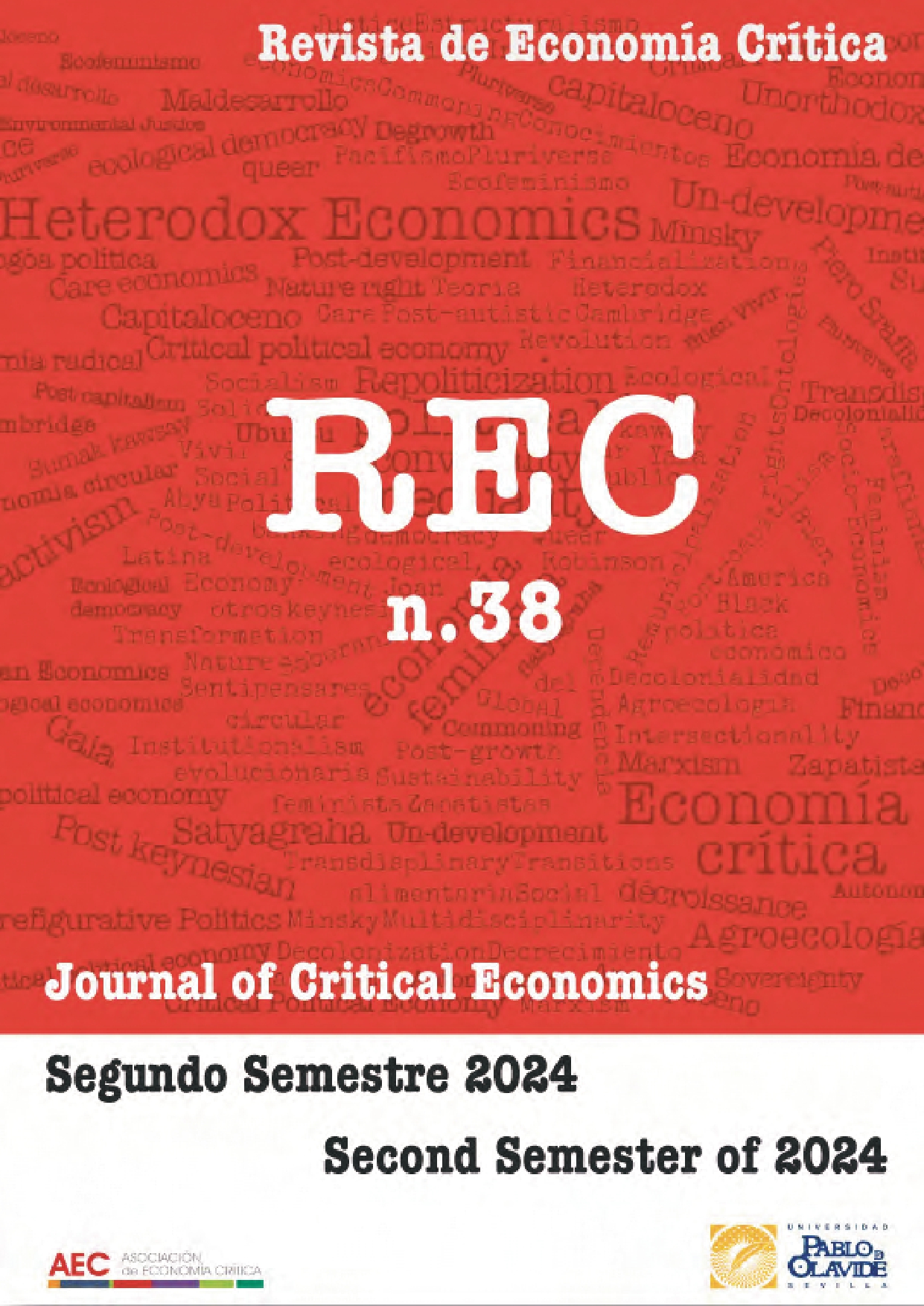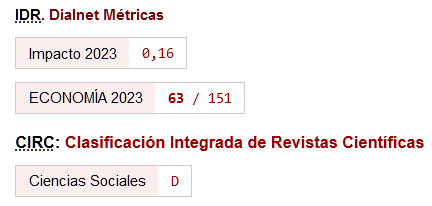The enterprise and the empire in the face of the current crisis of hegemony. Reflections on the transformations of global capitalism
DOI:
https://doi.org/10.46661/rec.11371Keywords:
Imperialism, Center-Periphery, Techno-economic Paradigms, Cognitive Capitalism, World-SystemAbstract
The current stage of capitalism at a global level can be defined as a crisis of hegemony, thanks to its successful diffusion throughout the vast majority of the world's territories. This global diffusion is closely linked to the imperialist processes initiated by the European powers at the end of the 19th century, allowing the expansion of the international market for industrial manufactures. At the beginning of the 21st century, a reconfiguration in economic relations is observed. Marked by the relocation of production within the framework of global value chains, processes of exclusion and inequality across countries are accentuated in a structural context of center and periphery that has not varied (at least substantially) since then. This crisis of hegemony poses two major challenges for the future: on the one hand, it manifests the growing incompatibility between the ruthless pursuit of individual economic benefits and Western democratic agendas; on the other hand, it highlights a logic of appropriation of life and bodies by capital that imposes new ethical limits on the accumulation process.
Downloads
References
Aglietta, Michel (1991): Regulación y crisis del capitalismo. Siglo XXI.
Aguiar de Medeiros, Carlos y Mazat, Numa (2019): “Geopolitics, Geoeconomics, and Development Strategies in the New Millennium”, en Victor Ramiro Fernández y Gabriel Brondino (Eds.), Development in Latin America: Critical Discussions from the Periphery (pp. 89–122). Springer International Publishing. https://doi.org/10.1007/978-3-319-92183-9_5
Brenner, Robert (2002): “The economy after the boom: A diagnosis”. International Viewpoint: News and Analysis for Socialists Worldwide, 342, 24-33.
Dabat, Alejandro; Bustos, Pablo y Toledo, Alejandro (1993): El mundo y las naciones. Centro Regional de Investigaciones Multidisciplinarias, UNAM.
Dabat, Alejandro (2006): “Capitalismo informático y capitalismo industrial. Acercamiento al perfil histórico del nuevo capitalismo”, Economía Informa, 338, enero-febrero, México DF.
Davis, Dennis, Kaplinsky, Raphael, y Morris, Mike (2018): “Rents, power and governance in global value chains”, Journal of World-Systems Research, 24(1), 43–71. https://doi.org/10.5195/jwsr.2018.662
Evans, Peter (1996): “El Estado como problema y como solución”, Desarrollo económico, 35(140), 529-562. https://doi.org/10.2307/3467372
Federici, Silvia y Hendel, Verónica (2010): Calibán y la bruja: Mujeres, cuerpo y acumulación primitiva. Traficantes de Sueños.
Freeman, Chris y Pérez, Carlota (1988): “Structural crises of adjustment, business cycles and investment behavior”, en Giovanni Dosi, Chris Freeman, Richard Nelson, Gerald Silverberg y Luc Soete (Eds.), Technical Change an Economy Theory (pp. 38-66). Londres, Pinter Publisher.
Gowan, Peter (1999): The global gamble: Washington’s bid for world dominance. London, Verso.
Guerra Vilaboy, Sergio (1997): “Etapas y procesos en la historia de América Latina”, Cuadernos de trabajo (No. 2). Instituto de investigaciones Histórico-Sociales, Universidad Veracruzana. Recuperado de https://cdigital.uv.mx/server/api/core/bitstreams/f704a305-a574-4408-a923-a707c25b975a/content
Harvey, D. (1982): The limits to capital. Blackwell.
Harvey, David (2003): “El “nuevo” imperialismo: Sobre reajustes espacio-temporales y acumulación mediante desposesión”, Socialist register. Buenos Aires: CLACSO, 2005. Recuperado de http://biblioteca.clacso.edu.ar/clacso/se/20130702120830/harvey.pdf
Lavarello, Pablo José y Sarabia, Marianella (2017): “La política industrial en la Argentina durante la década de 2000” en Martín Abeles, Mario Cimoli, Pablo Lavarello (eds.), Manufactura y cambio estructural: aportes para pensar la política industrial en la Argentina, Libros de la CEPAL, N° 149 (LC/PUB.2017/21-P), Santiago, Comisión Económica para América Latina y el Caribe (CEPAL). https://doi.org/10.18356/48881a27-es
Lebert, Didier y Vercellone, Carlo (2011): “El rol del conocimiento en la dinámica de largo plazo del capitalismo” en Vercellone, C (2011): Renta, saber y valor en el Capitalismo Cognitivo. Prometeo, Buenos Aires.
Mandel, Ernest (1986): Las ondas largas del desarrollo capitalista. Una interpretación marxista. Siglo XXI, Madrid.
Marx, Karl (2003): El capital: Libro segundo. El proceso de circulación del capital (F. Engels, Ed.; D. Catalán, Trad.). Siglo XXI Editores.
Mayére, Anne (1995): “La gestion des savoirs face au nouveau modéle industriel”, Revue française de Gestion, 105, 8-16.
Moreno Gálvez, Francisco Javier (2016). “Contradicción y crisis en el capitalismo cognitivo”. Chasqui. Revista Latinoamericana de Comunicación, (133), 101-111. https://doi.org/10.16921/chasqui.v0i133.3001
Negri, Antonio y Hardt, Michael (2002): Imperio. Paidós, Buenos Aires.
Rivera Ríos, Miguel Ángel, Lujano López, José Benjamín y García Veiga, Josué (2019): “Present and Future in the Mirror of the Past: Capitalist Dynamics, Digital Technology and Industry in the Fifth Kondratiev”, World Review of Political Economy, 10(4), 449-483. https://doi.org/10.13169/worlrevipoliecon.10.4.0449
Rosenberg, Nathan y Frischtak, Cláudio Roberto (1984): "Technological innovation and long waves", Cambridge Journal of Economics, 8, 7-24.
Sztulwark, Sebastián (2019): “La condición periférica en el nuevo capitalismo”, Problemas Del Desarrollo. Revista Latinoamericana De Economía, 51(200). https://doi.org/10.22201/iiec.20078951e.2020.200.68283
Veblen, Thorstein (2017): The theory of the leisure class. Routledge.
Vercellone, Carlo (2009): “Crisis de la ley del valor y devenir renta de la ganancia” en Vercellone, C., Fumagalli, A., Lucarelli, S., Marazzi, C., Mezzadra, S., y Negri, A. (eds.). La gran crisis de la economía global. Mercados financieros, luchas sociales y nuevos escenarios políticos. Traficantes de Sueños, Madrid.
Virno, P. (2003): “Diez tesis sobre la multitud y el capitalismo postfordista”. Contrapoder, 7, 29-42.
Downloads
Published
How to Cite
Issue
Section
License
Copyright (c) 2024 Federico Bachmann

This work is licensed under a Creative Commons Attribution 4.0 International License.
This licence allows third parties to share (copy and redistribute the material in any medium or format) and adapt (remix, transform and create from the material for any purpose, including commercial purposes), provided that authorship and first publication in this journal (The Journal, DOI of the work) is acknowledged, a link to the licence is provided, and it is stated whether changes have been made to the work.







